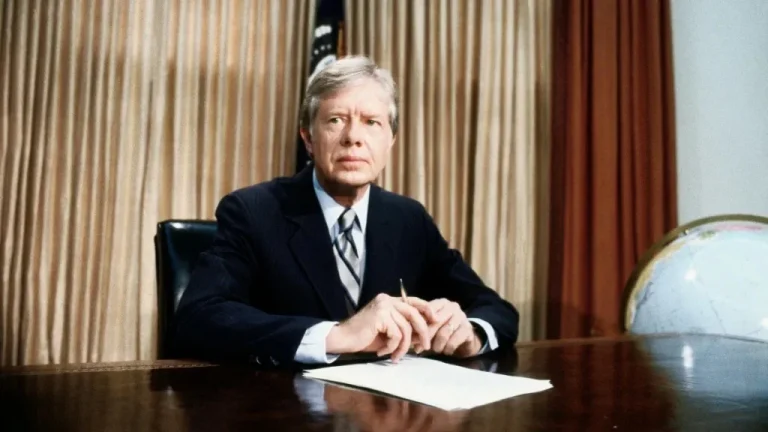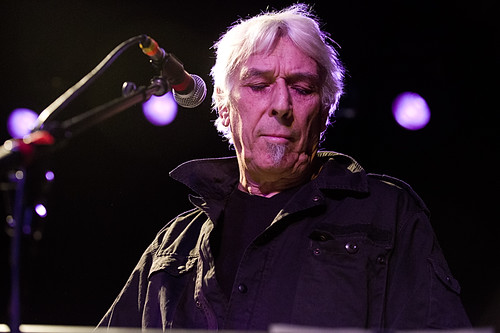Jimmy Carter, a beacon of diplomacy, faith, and humanitarianism, served as the 39th President of the United States from 1977 to 1981. A Nobel Peace Prize laureate and lifelong advocate for human rights, Carter remains one of America’s most respected elder statesmen. His journey from humble beginnings in rural Georgia to the world stage is a story of perseverance, leadership, and moral conviction.
Even decades after leaving the White House, Carter’s work in peacebuilding and global health continues to influence millions. His life represents a rare blend of political service and humanitarian purpose, reflecting his unwavering belief in justice and equality.
Quick Facts of Jimmy Carter
| Category | Details |
|---|---|
| Full Name | James Earl Carter Jr. |
| Date of Birth | October 1, 1924 |
| Place of Birth | Plains, Georgia, USA |
| Nationality | American |
| Profession | Politician, Author, Philanthropist |
| Spouse | Rosalynn Smith Carter |
| Children | John William, James Earl III, Donnel Jeffrey, and Amy Lynn |
| Estimated Net Worth (2024) | $10 million |
| Notable Achievements | Nobel Peace Prize (2002), Habitat for Humanity advocacy, Carter Center founder |
Early Life and Family Background
Jimmy Carter was born on October 1, 1924, in Plains, Georgia, to James Earl Carter Sr., a farmer and businessman, and Lillian Gordy Carter, a nurse known for her compassion and progressive ideals. Growing up during the Great Depression, Carter experienced both economic hardship and community resilience. These early lessons in discipline, faith, and empathy shaped his lifelong dedication to service.
From an early age, Carter displayed intellectual curiosity and moral conviction. The racial inequalities he witnessed in the segregated South would later inspire his commitment to civil rights and humanitarian causes.
Education
Carter graduated from Plains High School and began his studies at Georgia Southwestern College, later transferring to the Georgia Institute of Technology. He eventually earned a Bachelor of Science in Engineering from the U.S. Naval Academy in 1946. His years in the Navy instilled in him leadership, discipline, and a deep sense of duty — qualities that became essential in his political and humanitarian work.
Career Beginnings and Rise to Politics
After serving in the Navy, Carter returned to his hometown to manage his family’s peanut farm. With determination and innovative thinking, he transformed it into a prosperous business. However, witnessing social and economic struggles in his community inspired him to enter public service.
In 1962, Carter was elected to the Georgia State Senate, where he advocated for educational reform and government transparency. His pragmatic leadership and moral integrity helped him stand out in a politically divided era.
Governor of Georgia and Path to the Presidency
Carter’s success in state politics led to his election as Governor of Georgia in 1971. As governor, he championed racial equality, environmental protection, and government accountability. His progressive stance distinguished him from many Southern politicians of his time, helping him gain national recognition.
Building on this momentum, Carter launched his presidential campaign in 1976. His message of honesty, reform, and moral leadership resonated with a nation weary of political scandal. He won the election, becoming the 39th President of the United States.
Presidency and Key Achievements
Carter’s presidency focused on peace, human rights, and energy reform. His administration brokered the Camp David Accords between Egypt and Israel, a historic peace agreement that remains one of his greatest achievements. Additionally, he established the Department of Energy and promoted environmental conservation amid rising global concerns about energy dependency.
Although his presidency faced challenges — including inflation and the Iran hostage crisis — Carter’s post-presidential career redefined his legacy as a peacemaker and humanitarian.
Humanitarian Work and Global Impact
After leaving office, Carter devoted himself to humanitarianism through the Carter Center, founded in 1982. The organization works to advance democracy, fight disease, and promote human rights worldwide. Through initiatives targeting Guinea worm disease, malaria, and blindness, Carter’s work has saved millions of lives.
His efforts with Habitat for Humanity further demonstrate his commitment to hands-on service. He personally helped build homes for low-income families, inspiring global volunteerism. In 2002, his dedication to peace and humanitarianism earned him the Nobel Peace Prize.
Personal Life and Relationships
Jimmy Carter married Rosalynn Smith in 1946, shortly after graduating from the Naval Academy. Their marriage, lasting more than seven decades, became a model of partnership and mutual respect. Together, they raised four children — John, James, Donnel, and Amy — and shared a lifelong mission of public service.
Even after Rosalynn’s passing in 2023, Carter continued to honor her legacy by championing the causes they built together.
Net Worth and Lifestyle
As of 2024, Jimmy Carter’s estimated net worth is $10 million. Unlike many modern political figures, his wealth primarily comes from book royalties, speaking engagements, and modest investments. Carter and Rosalynn lived humbly in their Plains, Georgia home — the same house they built in 1961.
His frugality and authenticity earned him admiration across party lines. Despite his fame, he consistently prioritized purpose over profit.
Interesting Facts and Trivia
- Carter was the first U.S. president born in a hospital.
- He is an avid woodworker, crafting furniture and gifts for friends.
- His post-presidential life is the longest in American history, spanning over 40 years.
- He has authored over 30 books, ranging from political memoirs to reflections on faith.
Charitable Work and Legacy
The Carter Center remains one of the world’s leading humanitarian institutions, addressing global health crises and promoting democratic governance. Carter’s initiative to eradicate Guinea worm disease is hailed as one of the greatest modern public health achievements.
His legacy extends beyond politics — symbolizing integrity, compassion, and lifelong service. Few leaders have left such an enduring impact on both domestic and international stages.
Future Plans and Cultural Influence
Though retired from active public life, Jimmy Carter’s influence continues to guide global humanitarian efforts. His moral leadership, faith-based compassion, and tireless advocacy for peace inspire leaders and citizens worldwide.
In the end, Carter’s life stands as a testament to the power of humility and conviction — proving that genuine leadership transcends office, wealth, and time.








